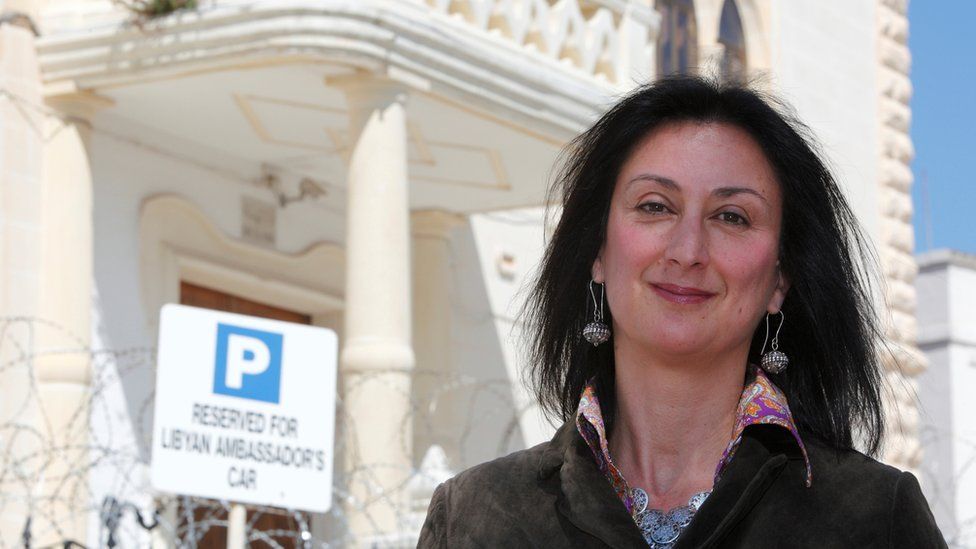With freedom of press being one of the pillars of a democratic state, it would make sense that the human rights of journalists are safeguarded. Yet the role of investigative journalists in a minefield of corruption and scandals often comes with a price to pay.
Speaking at the Council of Europe, Matthew, son of the murdered journalist, Daphne Caruana Galizia wrote, “In countries where there’s no will or capacity to prosecute the corrupt figures they expose, journalists often become the targets themselves.”. Four years later, with the prosecution of Daphne’s killers underway, it would make sense that the protection of journalists would be at the forefront of both domestic and international politics.

A report by the Group of States against Corruption (GRECO) shows that since 1992, two-thirds of all murdered journalists were covering politics and corruption. This gruelling figure only recently coming to light after the death of veteran journalist, Giorgos Karaviaz who was shot dead outside his home in Athens.
Greek authorities have labelled the killing ‘a professional hit’ after the Committee to Protect Journalists (CPJ) called for an open, transparent investigation. Whilst the motives behind his death remain unclear. Georgio’s work which covered organised crime often highlights the realities in which journalists are forced to endure.
This reality is best described by journalist Kostas Vaxevanis, who writes “When journalists are killed and the killer is not a madman, it means that democracy is rotten and the people must live with the stench.’ Thus the reality in which journalists are murdered is underpinned by a complex web of politics and corruption. With the deepening of interregionalism, the question we have to ask is: What are governments doing about the protection of their journalists?
The President of the European Commission, Ursula Von Der Leyen spoke in response to the death of Giorgos Karaviaz and stated how “Europe stands for freedom. And freedom of press may be the most sacred of all“. Despite this, the total number of deaths of journalists doubled to 30 in 2020, a report by the Committee to Protect Journalists uncovered.
A 2013 Debate by the council of Europe, pledged that individual states must nurture an environment based around the primary duty of integrity and protection of journalists. However, in recent events, some states have been far behind in the crackdown of political corruption.
In an editorial titled ‘The Long Road to Justice’. It was noted how Keith Schembri, a prominent figure in the articles written by murdered journalist, Daphne Caruana Galizia, was arrested for charges that did not include the involvement in her assassination. Whilst the prosecution of corrupt politicians has been selective across the world stage, it is not a clear-cut system and many EU states have been hesitant to litigate against the people who have been exposed by journalists for their crimes.
Without an entrenched system in place that forces states to cooperate in the investigations of murdered journalists, the names of Daphne Caruana Galizia, Giorgos Karaivas and so many others can be trampled on by acts of suppression. In the absence of government intervention, it is down to Non Governmental Organisations (NGOs) to carry on their legacy.
In countries that have been colonised by their leader’s own ambitions, it is in the people’s interest to move the country forward. Thus the role of civil society and NGOs has been to uphold an environment for journalists that EU states pledged to follow. Despite this, the threat of a destructive state continues to loom over society with recent social movement Republika being targeted by the Maltese government, arguing “Prime Minister, we will not be silenced”.
To answer the question about the future of journalism, the answer can be found in chapter 3 of a report by the House of Lords. Is it ever acceptable for journalists to break the law in the interest of the public? However, by rephrasing that, the picture becomes much clearer.
Is it ever acceptable for corrupt individuals to commission the murder of journalists for their private interests?
For those journalists who have passed away: their legacies will be continued, to uphold that broken pillar of democracy. Without journalism, corruption spreads like a virus. So for that reason:
Keep writing.
Header image shows police at the scene of Giorgos Karaivas’ murder/ credit: BBC

